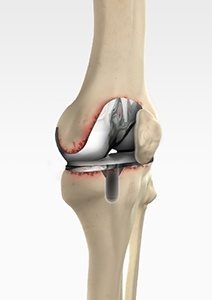
Knee Revision Surgeon in Raleigh, Garner, Cary, NC.
Although total knee replacement surgery is successful, sometimes the procedure can fail due to various reasons and may require revision surgery. Dr. McNabb provides diagnosis and individualized non-operative and operative treatment plans in Raleigh, Garner, Cary, NC. Dr. McNabb also provides highly specialized care during and after the surgery. Contact Dr. McNabb’s office for an appointment today!

What is Revision Knee Replacement?
Revision knee replacement surgery involves replacing a part or all your previous knee prosthesis with a new prosthesis. Although total knee replacement surgery is successful, sometimes the procedure can fail due to various reasons and may require a second revision surgery.
What is Arthritis?
The knee joints are lined by soft articular cartilage that cushion the joints and aid in smooth movement of the joint bones. Degeneration of the cartilage due to wear and tear leads to arthritis, which is characterized by severe pain.
What is Total Knee Replacement?
During total knee replacement, the damaged cartilage and bone is removed from the knee joint and replaced with artificial components. Artificial knee joints are usually made of metal and plastic, and consist of the femoral, tibial, and patellar components.
Indications for Revision Knee Replacement
Revision knee replacement surgery may be advised if you have one or more of the following conditions:
- Trauma to the knee joint
- Increased pain in the affected knee
- Worn out prosthesis
- Knee instability or a feeling of giving way while walking
- Loosening of the prosthesis
- Infection in the prosthetic joint
- Weakening of bone around the knee replacement - a process known as osteolysis (bone loss)
- Stiffness in the knee
- Fracture
Risks and Complications of Revision Knee Replacement
Like all major surgical procedures, there may be certain risks and complications involved with revision knee replacement surgery. The possible complications after revision knee replacement include:
- Stiffness in the knee
- Infection
- Bleeding
- Formation of blood clots in the leg veins
- Injury to nerves or blood vessels
- Prosthesis failure
- Patella (kneecap) dislocation
- Ligament injuries
If you would like to have additional information on the treatment of various knee conditions or would like to learn more about revision knee replacement, please contact Dr. McNabb, serving the communities of Raleigh, Garner, Cary, NC.






